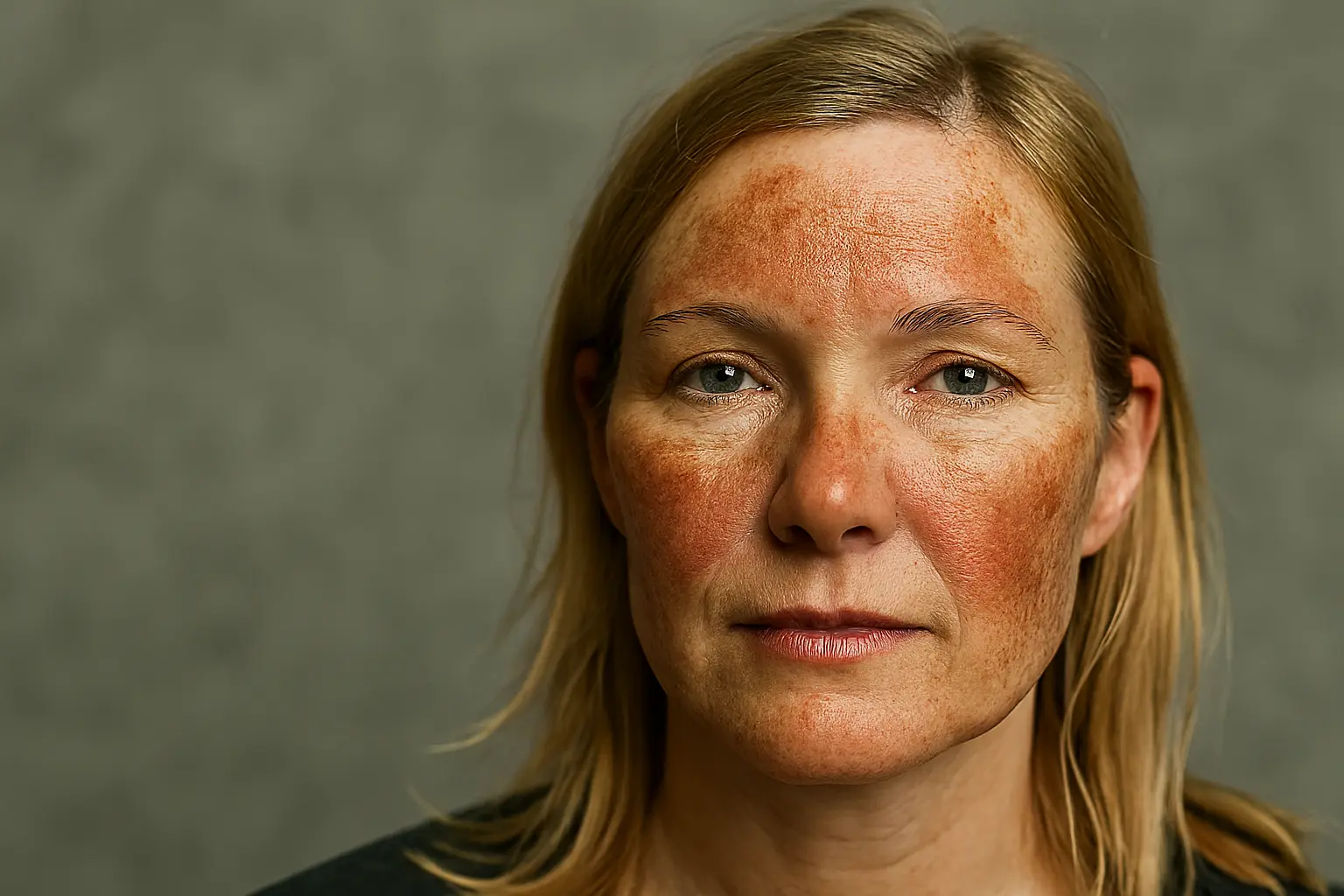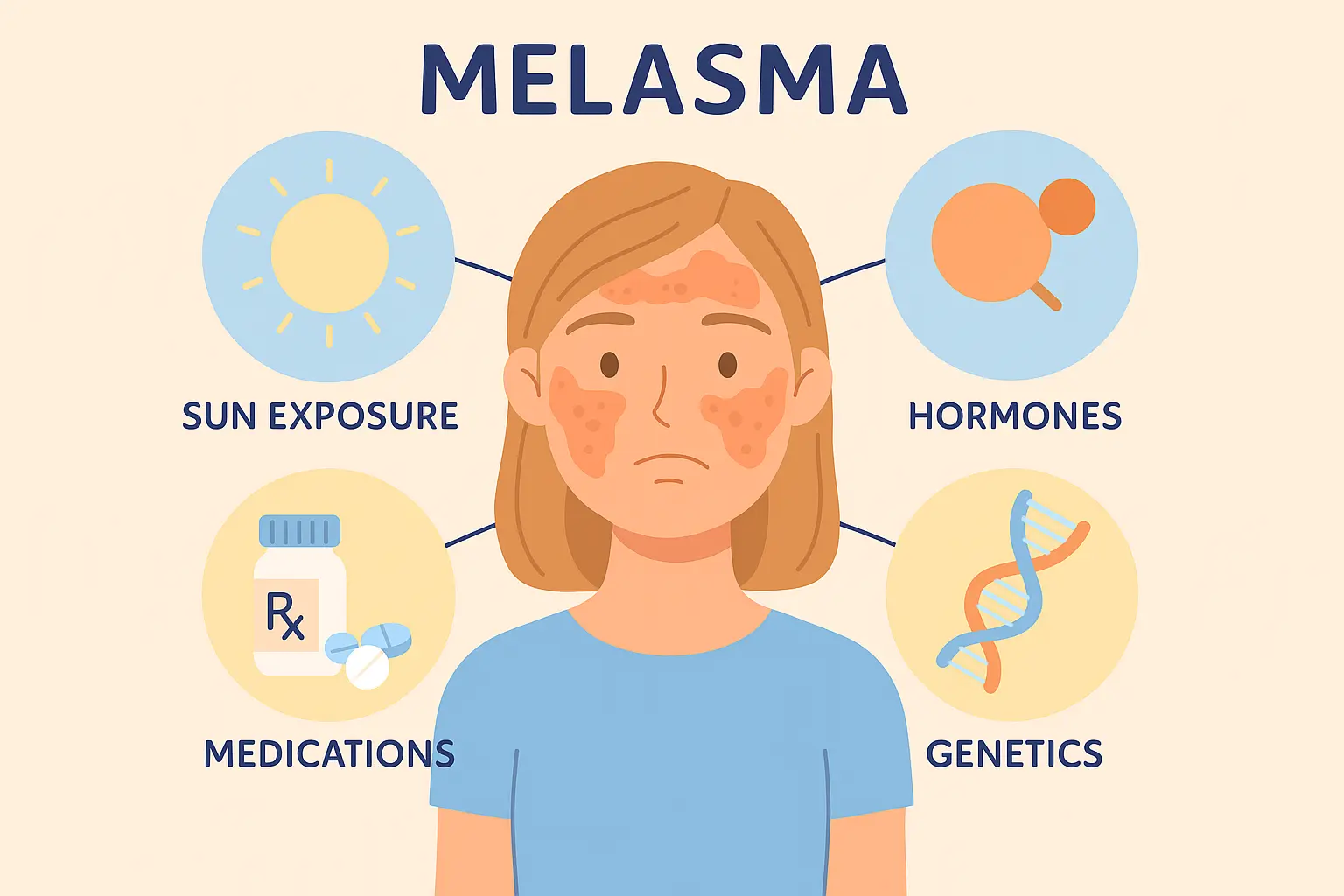What Is Melasma?
Melasma is a common, chronic pigmentation disorder known for causing symmetrical, patchy areas of brown or grey discolouration on the face. It is often referred to as the "mask of pregnancy," although it affects many women outside of gestation.
It is clinically characterised by:
- Symmetrical Distribution Patches commonly appear mirrored on both sides of the face (e.g., both cheeks, across the nose, or along the upper lip).
- Location Most often seen on the face — cheeks, forehead, upper lip, and chin.
- Appearance Patches have irregular borders and typically range from light tan to dark brown or even blue-grey.
- Prevalence Highly common in women, especially those with darker or olive skin tones (Fitzpatrick skin types III-VI), and rarely seen in men.
It’s often mistaken for sun damage or freckles, but requires specialist assessment for accurate diagnosis and treatment.

Causes of Melasma
Melasma is a complex skin condition where melanocytes (pigment-producing cells) become highly responsive and overactive. It is a multi-factorial condition, meaning several factors often work together to cause the pigmentation:
- UV Exposure (The Primary Factor) Ultraviolet (UVA/UVB) and visible light energy penetrate the skin, stimulating melanocytes to produce melanin as a defensive response. Even small amounts of sun exposure can trigger or darken existing melasma.
- Hormonal Changes Elevated levels of oestrogen and progesterone (during pregnancy, menopause, or from oral contraceptives/HRT) interact with melanocytes, making them extremely sensitive to light.
- Genetic Predisposition Approximately 30-50% of patients report a family history of melasma, indicating a strong genetic link.
- Heat and Inflammation Exposure to heat (e.g., saunas, hot yoga) or chronic skin irritation can cause inflammation, which further stimulates pigment production.

Our 4-Step Hyperpigmentation Care Pathway
- Specialist Consultation
In-depth assessment using dermoscopy to confirm melasma and rule out other pigmentation conditions. - Personalised Treatment Plan
Tailored plan may include topical creams, chemical peels, or laser/light therapy depending on skin type. - In-Clinic Treatments
Performed with precision to fade patches while minimising irritation and rebound pigmentation. - Aftercare & Long-Term Prevention
Skincare advice, SPF routines, and follow-up to reduce recurrence and protect results.
100% Satisfaction Guarantee
If you're not completely satisfied with your treatment results within 30 days, we'll provide a refund* or free re-treatment. Your satisfaction is our priority.
Licensed & Insured • Risk-Free Treatment
Melasma Treatment Options at Revitalise London
Treatment is focused on reducing existing pigment and preventing recurrence. Our GMC dermatologists customise a plan that is safe for your skin type, often combining therapies for best results:
- Advanced Topical Depigmenting Agents Prescription formulas containing key ingredients like Hydroquinone, Tretinoin (Retinoids), Azelaic Acid, and Kojic Acid to inhibit melanin production.
- Specialised Chemical Peels Gentle, superficial peels (such as lactic acid or glycolic acid) selected specifically to exfoliate pigmented skin cells without causing inflammation.
- Targeted Laser & Light Therapies Low-fluence, non-ablative lasers (e.g., Pico or Q-Switched lasers) used with precision to break down deep pigment while minimizing heat and the risk of rebound hyperpigmentation.
- Professional Microneedling Used in combination with depigmenting serums to deliver active ingredients deeper into the skin where pigment is rooted.
- Maintenance Skincare Development of a critical, long-term routine involving high-quality physical sunscreens and antioxidants to maintain results and suppress future pigment formation.
Why Choose Revitalise London?
We combine clinical excellence with a patient-first approach. Here's why hundreds trust us:
Nathalie Emmanuel
Actress - Game of Thrones Star
Had a wonderful experience with Dr Ken and his staff with my forehead lipoma removal. Thorough in planning before the procedure and so far, l've had a great experience with aftercare. When I had any questions there was always someone available to answer them.

Our Medical Team
Meet the experienced professionals who will provide your care
Our Accreditations
Trusted by healthcare regulators and professional bodies for maintaining the highest standards of medical care and patient safety.



🛡️ Regulated & Certified Healthcare
All treatments are performed by GMC registered doctors in our CQC regulated clinic, ensuring the highest standards of safety and care.
Frequently Asked Questions about Melasma
Melasma typically cannot be permanently cured, but it can be effectively controlled and improved with consistent treatment. Long-term management using topical creams, sun protection, and professional skin procedures like chemical peels or laser therapy can significantly reduce pigmentation. Recurrence is common without maintenance.
In some cases, especially when triggered by pregnancy or hormonal changes, melasma may gradually fade over time. However, most cases require professional dermatological treatment to achieve noticeable and lasting results. Without proper care, the patches may persist or worsen.
No, melasma is not dangerous or harmful to your health. It’s a benign skin condition, but it can cause emotional distress and self-esteem issues due to its visibility, especially on the face. Addressing it cosmetically can have a positive impact on confidence and overall well-being.
The best treatment for melasma varies depending on your skin type, pigmentation depth, and triggers. Options include prescription creams (like hydroquinone or tranexamic acid), chemical peels, microneedling, and laser therapy. Our dermatologists provide customized treatment plans tailored to your skin and goals.
Melasma is commonly triggered by sun exposure, hormonal changes (e.g., pregnancy, birth control), genetics, and certain medications. UV rays and heat can worsen pigmentation, making daily sun protection essential. Identifying and managing triggers is a key part of long-term control.
While melasma is primarily a skin condition, healthy lifestyle choices may support treatment. A diet rich in antioxidants, reducing stress, avoiding excessive sun exposure, and maintaining hormonal balance may help prevent flare-ups. However, diet alone is unlikely to clear pigmentation without targeted skin therapies.





